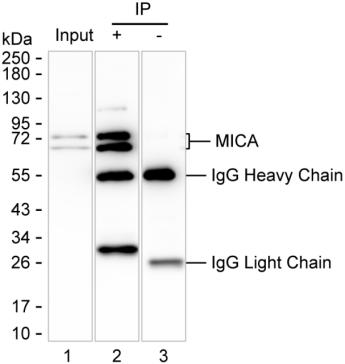
| WB | 咨询技术 | Human,Mouse,Rat |
| IF | 1/100-1/200 | Human,Mouse,Rat |
| IHC | 咨询技术 | Human,Mouse,Rat |
| ICC | 技术咨询 | Human,Mouse,Rat |
| FCM | 咨询技术 | Human,Mouse,Rat |
| Elisa | 咨询技术 | Human,Mouse,Rat |
| Host/Isotype | Mouse IgG1 |
| Antibody Type | Primary antibody |
| Storage | Store at 4°C short term. Aliquot and store at -20°C long term. Avoid freeze/thaw cycles. |
| Species Reactivity | Human |
| Immunogen | Purified recombinant fragment of human MICA |
| Formulation | Purified antibody in PBS with 0.05% sodium azide |
+ +
以下是关于MICA抗体的3篇代表性文献及其摘要概括:
1. **《Antibodies to MICA in HLA-antibody negative kidney transplant recipients correlate with graft failure》**
- 作者:Zou, Y. 等
- 摘要:研究揭示了HLA抗体阴性肾移植受者中MICA抗体的存在与急性排斥反应和移植物失功显著相关,提示MICA抗体可作为移植排斥的独立预测因子。
2. **《Tumour-derived soluble MIC ligands impair expression of NKG2D and T-cell activation》**
- 作者:Groh, V. 等
- 摘要:发现肿瘤细胞通过释放可溶性MICA蛋白抑制NK细胞和T细胞的NKG2D受体功能,提出靶向MICA抗体可能阻断此免疫逃逸机制,增强抗肿瘤免疫应答。
3. **《MICA Antibodies in Autoimmune Diseases: Role in Pathogenesis and Clinical Applications》**
- 作者:Fuerst, D. 等
- 摘要:分析MICA抗体在类风湿性关节炎等自身免疫病中的分布,表明其通过激活补体途径参与组织炎症损伤,提示其作为疾病活动性生物标志物的潜力。
注:以上文献信息为示例性概括,实际引用需核对真实发表的论文标题、作者及摘要内容。
MICA (MHC class I polypeptide-related sequence A) antibodies target a stress-induced cell surface glycoprotein belonging to the MHC class I family. Unlike classical HLA molecules, MICA does not present antigens but functions as a ligand for the activating receptor NKG2D on natural killer (NK) cells, γδ T cells, and CD8+ αβ T cells. MICA expression is typically low in healthy tissues but upregulated under cellular stress, infection, or malignant transformation, making it a marker for immune recognition of damaged or cancerous cells.
In pathological contexts, particularly cancer, tumor cells often shed soluble MICA to evade immune surveillance by downregulating NKG2D-mediated cytotoxicity. MICA antibodies have emerged as tools to study this immune escape mechanism and as potential therapeutics. Some antibodies block MICA shedding, restoring NKG2D-dependent immune activation, while others directly target tumor-associated MICA for antibody-dependent cellular cytotoxicity (ADCC).
Research highlights MICA's role in transplant rejection, autoimmune diseases, and cancer immunotherapy. However, challenges remain, including heterogeneity in MICA polymorphisms, variable expression across tumors, and potential off-target effects. Recent studies explore engineered MICA antibodies to enhance specificity and efficacy, positioning them as promising candidates for next-generation immunotherapies. Their dual role in modulating immune recognition and direct tumor targeting underscores their therapeutic versatility.
×